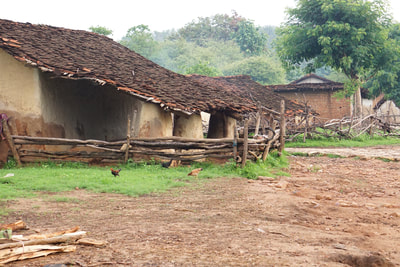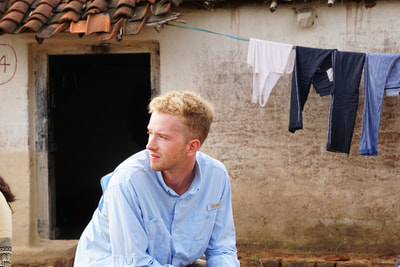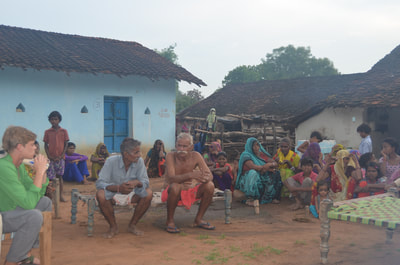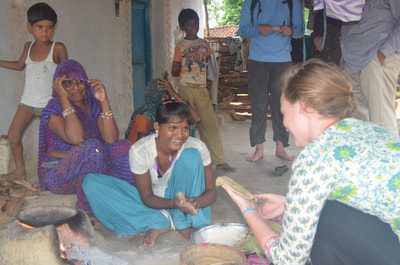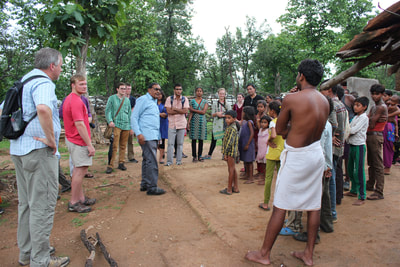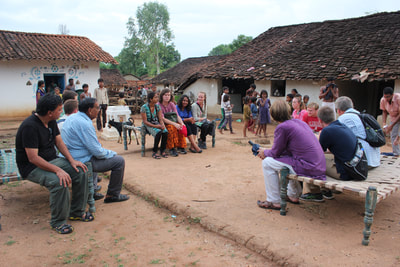Tribal Village: 1st Segment of Poverty
The tribal people are groups of families who have lived off the land for centuries as hunter-gatherers without recognizing any land as belonging to them. To them, the idea of owning any given spot of land is like claiming to own a pocket of air at coordinates above the earth. In the past, students visited a tribe that lives in Panna, the buffer zone of a forest reserve for tigers.
As their nomadic lifestyle comes into conflict with environmental conservation efforts, many of these tribes in central India have been relocated. They were moved off their traditional land to create a reserve for the bengal tigers. They are allowed to live in homes provided by the government, but they lack access to basic resources such as electricity. On the 2017 trip, the villagers said that the government had notified them that they were going to be moved off of the land and would receive a large compensation.
As their nomadic lifestyle comes into conflict with environmental conservation efforts, many of these tribes in central India have been relocated. They were moved off their traditional land to create a reserve for the bengal tigers. They are allowed to live in homes provided by the government, but they lack access to basic resources such as electricity. On the 2017 trip, the villagers said that the government had notified them that they were going to be moved off of the land and would receive a large compensation.
Field Visits - Summers of 2015, 2016, and 2017
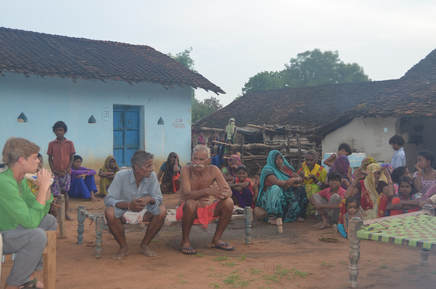
For the 2015, 2016, and 2017 trips, students visited a tribal village outside of Khajuraho.
Upon arrival to the villages, students had a conversation with the village leaders, then broke into smaller groups to visit individual homes and speak with families. These conversations tended to revolve around issues like health, safety, food security, and the role of men, women, and children in the village; they were framed much like group interviews conducted by the students. Over the years, this village has offered a unique opportunity to study two topics: leadership and the role of women and the caste system in rural society. There is a lack of leadership in the village, many of the young men go to work in the cities or for mining companies, leaving a void in the community. The tribe has been conditioned to depend on the government for almost every aspect of life.
As the group returns to the same village year after year, they speak with different members of the village and are able to gain a more complete view of their experiences.
"The tribal community was very different than the other villages we visited. The men addressed us as the women stayed away out of shyness and cultural notions of inferiority. We asked the men many questions about their socioeconomic situation and their greatest challenges. The most apparent was a lack of leadership. "
- Evan Rogers, student from the 2015 trip
Upon arrival to the villages, students had a conversation with the village leaders, then broke into smaller groups to visit individual homes and speak with families. These conversations tended to revolve around issues like health, safety, food security, and the role of men, women, and children in the village; they were framed much like group interviews conducted by the students. Over the years, this village has offered a unique opportunity to study two topics: leadership and the role of women and the caste system in rural society. There is a lack of leadership in the village, many of the young men go to work in the cities or for mining companies, leaving a void in the community. The tribe has been conditioned to depend on the government for almost every aspect of life.
As the group returns to the same village year after year, they speak with different members of the village and are able to gain a more complete view of their experiences.
"The tribal community was very different than the other villages we visited. The men addressed us as the women stayed away out of shyness and cultural notions of inferiority. We asked the men many questions about their socioeconomic situation and their greatest challenges. The most apparent was a lack of leadership. "
- Evan Rogers, student from the 2015 trip

